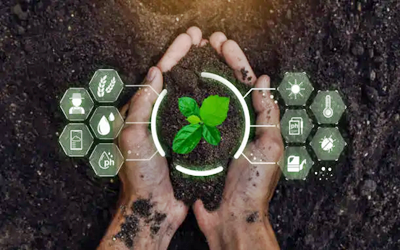Agriculture and Faming Technology (Agritech)

₦40000
Course Overview: The Agriculture/Farming Technology course offers an in-depth study of modern agricultural practices, technologies, and innovations that shape the future of farming. The course is designed for students who want to understand technology integration in agriculture, aiming to improve productivity, sustainability, and food security. It covers the essentials of crop and livestock production, precision agriculture, smart farming techniques, and automation and data analytics in agriculture. The course prepares students to become leaders in the agricultural sector, equipping them with the knowledge and skills needed to solve real-world challenges in food production and environmental sustainability. Learning Objectives: By the end of this course, students will: • Understand the principles and practices of sustainable agriculture and precision farming. • Learn how to use and integrate modern agricultural technologies such as drones, sensors, and GPS for crop management. • Gain knowledge of soil health, plant nutrition, irrigation systems, and crop protection techniques. • Develop skills in analyzing agricultural data to optimize crop yields and manage resources efficiently. • Explore advancements in agricultural biotechnology and their application in improving crop varieties. • Understand the role of automation and robotics in agriculture and their impact on labor efficiency. • Learn about climate-smart agricultural practices and strategies for adapting to climate change. Course Modules: Module 1: Introduction to Agriculture and Farming Technology • Overview of Agricultural Systems • History and Evolution of Farming Practices • Role of Technology in Agriculture • Types of Farming: Traditional vs. Modern • Global Trends in Agriculture and Food Security • Agricultural Challenges and Opportunities Module 2: Precision Agriculture and Smart Farming • Introduction to Precision Agriculture • Geographic Information Systems (GIS) in Agriculture • GPS and Remote Sensing Technologies for Farm Management • Drones and Aerial Imaging in Crop Monitoring • Use of IoT (Internet of Things) Sensors for Soil and Crop Management • Data Analytics for Yield Prediction and Optimization Module 3: Soil Science and Plant Nutrition • Soil Composition, Structure, and Properties • Soil Fertility and Health Management • Nutrient Management and Fertilizer Application Techniques • Soil Testing and Analysis for Optimizing Crop Production • Organic Farming Practices and Soil Conservation Module 4: Crop Production and Management • Principles of Crop Production • Field Crops, Horticultural Crops, and Greenhouse Management • Crop Rotation, Intercropping, and Polyculture • Integrated Pest Management (IPM) and Weed Control • Post-Harvest Management and Storage Techniques • Climate Change and its Impact on Crop Production Module 5: Livestock Production and Management • Overview of Animal Husbandry Practices • Livestock Breeding, Genetics, and Nutrition • Health Management and Disease Control in Livestock • Dairy and Meat Production Systems • Integration of Technology in Livestock Farming • Animal Welfare and Ethical Considerations in Farming Module 6: Irrigation Systems and Water Management • Water Management Techniques in Agriculture • Types of Irrigation Systems: Drip, Sprinkler, and Surface Irrigation • Design and Implementation of Irrigation Systems • Water Harvesting Techniques for Sustainable Farming • Use of Sensors for Monitoring Soil Moisture • Managing Water Resources in Drought-prone Areas Module 7: Agricultural Machinery and Automation • Overview of Agricultural Machinery and Equipment • Role of Automation and Robotics in Farming • Tractors, Harvesters, and Planting Equipment • Use of Automated Systems for Greenhouse Management • Integration of AI and Machine Learning in Farm Automation • Economic and Labor Impacts of Automation in Agriculture Module 8: Agricultural Biotechnology and Genetic Engineering • Basics of Agricultural Biotechnology • Genetic Modification and Gene Editing in Crops • Biotechnological Solutions for Pest and Disease Resistance • Development of High-Yield and Drought-Resistant Crops • Ethical and Regulatory Aspects of Agricultural Biotechnology • Case Studies: Success Stories in Agri-Biotech Innovations Module 9: Climate-Smart Agriculture and Sustainable Practices • Understanding Climate-Smart Agriculture (CSA) • Strategies for Mitigating Climate Change in Agriculture • Carbon Sequestration and Greenhouse Gas Management • Organic Farming and Regenerative Agriculture • Sustainable Agroforestry and Permaculture Practices • Adaptation Strategies for Climate Resilience in Farming Module 10: Entrepreneurship in Agriculture and Farm Management • Principles of Farm Business Management • Agricultural Value Chains and Market Access • Developing Business Plans for Agribusiness • Access to Finance and Grants for Agricultural Enterprises • Digital Marketing and E-commerce for Farm Products • Case Studies: Successful Agripreneurs and Farming Startups Practical Components: The course will include hands-on training sessions and fieldwork to apply theoretical knowledge. Students will engage in activities such as: • Soil and water testing • Crop scouting using drones and sensors • Setting up irrigation systems and monitoring soil moisture • Managing a greenhouse or small farm plot • Data collection and analysis using agricultural software • Visits to local farms, agribusinesses, and agricultural technology hubs Assessment Methods: • Assignments and Project Work • Quizzes and Mid-term Examinations • Practical Field Reports and Lab Work • Final Capstone Project focusing on a real-world agricultural problem • Group Presentation on Innovative Farming Solutions Career Opportunities: Graduates of this course will be prepared for roles such as: • Precision Agriculture Specialist • Farm Manager or Agronomist • Agricultural Extension Officer • Agribusiness Entrepreneur • Agricultural Data Analyst • Farm Equipment and Technology Sales Representative • Climate-Smart Agriculture Consultant This Agriculture/Farming Technology course aims to shape the next generation of agricultural professionals who can leverage technology to drive efficiency, improve productivity, and create sustainable solutions for global food challenges.
Learn more
 0
0 